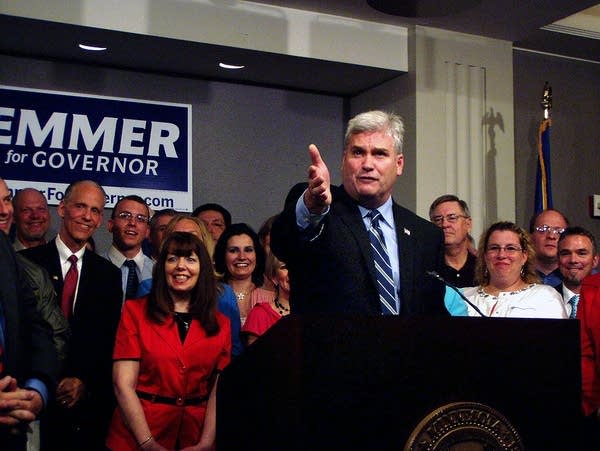Emmer keeps tips talk alive, says they could be tax-free
Go Deeper.
Create an account or log in to save stories.
Like this?
Thanks for liking this story! We have added it to a list of your favorite stories.

Usually when a candidate makes a misstep on the campaign trail, the campaign does whatever it can to change the subject.
Not so when it comes to Rep. Tom Emmer and the minimum wage.
Last week, the Republican candidate for governor was heavily criticized for suggesting that some restaurant wait staff earn $100,000 a year with tips and that restaurant owners should be able to pay servers less than the minimum wage.
Since then, Emmer has said the media has mischaracterized his position, shadowed a waiter at a local restaurant, and scheduled a town hall forum to meet with wait staff. Emmer is also proposing exempting tips from state income taxes.
Turn Up Your Support
MPR News helps you turn down the noise and build shared understanding. Turn up your support for this public resource and keep trusted journalism accessible to all.
"What it does for somebody who, say, earns $20,000 a year, it puts another $500 in their pocket. Or someone who makes another $30,000 a year, it puts another $800 in their pocket," he said.
Emmer's campaign said the plan would cost the state treasury roughly $17 million a year. But an official with the Minnesota Department Revenue couldn't say how much Emmer's plan would cost because employees report wages and tips together on tax forms.
Revenue officials also said it would be difficult, but not impossible, to administer Emmer's plan.
Emmer said his proposal, which also gives tax breaks to restaurant owners, would help create jobs in the hospitality industry. He's also trying to soothe the outrage created by his comments.
Meanwhile, Emmer's political opponents are working to keep the issue alive. Independence Party candidate Tom Horner called Emmer's latest plan "pandering." Democrats have pointed to Emmer's efforts to abolish the minimum wage during his time in the Legislature and his past comments that the minimum wage is a form of "socialism."
House Speaker Margaret Anderson Kelliher, a Democrat, also tried to keep the pressure on Emmer by appearing with several waitresses at a Tuesday afternoon news conference in St. Paul's Lowertown. Lissi Corbett, a server at a downtown pub, said she's not impressed with Emmer's tax plan.
"I'm not here to say anything negative about Tom Emmer but I will say this: I wouldn't vote for him if he gave me a $100,000 tip," Corbett said.
Kelliher, who is vying with two others for the DFL nomination for governor, said she wants to increase the minimum wage by $1.50 an hour. The move is an attempt to win support from some of Minnesota's lowest paid workers.
Wade Luneberg, secretary treasurer of Unite Here Local 17, a union that represents restaurant workers and is backing Kelliher, said Emmer's rhetoric is backfiring and helping the union's cause. Most of the people working for tips in Minnesota had no idea Minnesota is one of only seven states where servers get the full minimum wage and tips, he said.
"If you're serving dinner to customers in Hudson, Wis., you're making half of what a minimum wage worker is making in Stillwater and until that was really made clear by Rep. Emmer, I'm not sure that was something that resonates with 45,000 people," he said. "And now it does."
Unite Here has defeated past legislative efforts to institute what's known as a tip credit for restaurant owners.
Dave Siegel, with the Minnesota Restaurant Association, is on the other end of that debate. He said his association doesn't want to cut wages but instead it wants a tip credit if the state raises the minimum wage in the future.
"Really what the tip credit is, is a recognition that this is a unique kind of job where there's really no other job like this in the country where a substantial portion of the compensation is a tip that these waiters and waitresses earn," he said.
Siegel said he knows that the debate over the minimum wage is an emotional one, but he is a bit surprised it's gotten so fierce. He said he hopes that state lawmakers and the governor would be open to their arguments next year.



